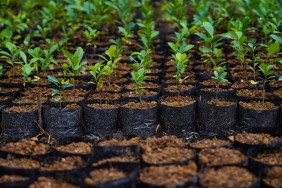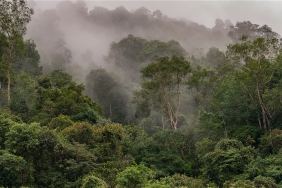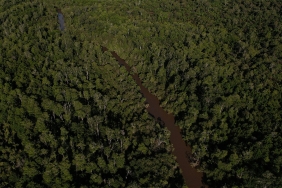NOT JUST WOOD
At the start of this century, the Indonesian island of Lombok faced a crisis. Fallen trees on the slopes of Rinjani, the volcano that dominates the island, had caused springs to dry up and water supplies to dwindle, leaving residents living in the capital Mataram battling daily water shortages.
The solution then? A push to restore and preserve the forests upstream, with a small levy added to business and household water charges to pay for it. As the trees grow back, water is not long in coming.
This is a clear illustration of the value of forests - and how this value can be developed through payment for the services, such as water supply, that forests provide.
So can forest managers find a market for these additional benefits, commonly called ecosystem services? The Forest Stewardship Council (FSC), a global non-profit organization that sets standards and certification schemes for managed forests, has developed a scheme that aims to help them do just that. Building on the experience of community-owned forests in Lombok, among others, it is the first global standard to demonstrate forest management has a positive impact on ecosystem services.
"FSC certification gives confidence that forests are well managed, so in theory, they can have positive impacts for people and nature," said Angga Prathama Putra, Forest Responsibility, National Coordinator, who leads WWF-Indonesia's work on forestry. "And if those impacts can be demonstrated and verified, they will be better recognized by society and valued in the marketplace."
With support from WWF, the Forest Care Community Group (KMPH) from Seasot Village, was able to demonstrate that maintaining forest cover at a crucial water capture time can have a positive impact on downstream water provision.
KMPH has 1224 members, who own less than half a hectare each. Collectively, they planted more than 35000 trees around 12 springs, which provide water to surrounding villages and a hydroelectric plant. Among the species planted, there is a wide variety of fruit-bearing trees - candlenut, rambutan, durian, mangosteen, and avocado - that can help local residents generate income. Locals also collect honey, rattan, rubber, and bamboo.
"The reforestation carried out by KMPH is very good" said Rahman, chairman of KMPH. "This can be seen from the condition of the river and springs. Water quantity has started to stabilize, the river no longer runs dry during the dry season, and the water discharge is always sufficient for hydropower generation. Water quality has also improved - water is being used by water companies, and also by local residents for drinking."
With the FSC ecosystem services certificate, KMPH will have independent verification from an internationally respected organization that their forest management has made significant changes to the water supply. Rahman hopes that this will allow the community to monetarily benefit - potentially from water companies, hydropower plants, or downstream businesses - which will provide further incentive to restore and conserve the forest.
In addition to the work in Lombok, WWF is coordinating two other projects in Indonesia, in the provinces of East and West Kalimantan, Borneo, in collaboration with the Indonesian Ministry of Environment and Forestry and local NGOs.
In East Kalimantan, work focused on carbon and biodiversity in an 84850 hectare logging concession owned by PT Ratah Timber. The area already has an FSC forest management certificate - which means its timber can be sold with the FSC label, showing that it comes from well-managed forests. Now, the company can demonstrate that the way it reduces the impact of logging results in positive impacts on carbon and biodiversity.
While preserving important areas for conservation, Ratah Timber's careful harvesting methods have been shown to allow forests to regenerate faster than conventional logging concessions. Monitoring of high wildlife density and distribution. A number of extinct birds and mammals, such as the bay cat, were caught on camera in areas where the harvesting method was implemented.
Measurements also show that Ratah Timber's forest management helps maintain forest carbon levels. Although harvesting the forest will lead to carbon removal, this is lower in Ratah Timber's concessions than in other forests: an average of 4.68 tons of carbon has been lost per hectare, compared to 60.2 tons in East Kalimantan as a whole.
In West Kalimantan, the focus is on recreational services - specifically, the efforts of local community organization Kelompok Pengelola Pariwisata (KPP) to manage 7000 hectares of forest for ecotourism. This community forest is part of a beautiful landscape, adjacent to the Danau Sentarum National Park. It is rich in wildlife, with orangutans, proboscis monkeys, crocodiles, sun bears, pangolins and many kinds of birds, and has high tourism potential. The community also hopes to sell non-timber forest products such as honey and handicrafts.
These sites in Indonesia are three of ten pilot projects around the world that have been selected by FSC to develop a methodology for measuring and verifying ecosystem services.
"Maintaining environmental and social values has always been at the core of the FSC standard, but forest managers have historically had to bear the costs of providing these benefits to society," explained Chris Henschel, manager of FSC's ecosystem services program. "By providing tools to help access payments for ecosystem services, we can strengthen incentives and rewards for responsible forest management."
Drawing on experience in Indonesia and elsewhere, the newly launched FSC Ecosystem Services Procedure provides forest managers, including smallholders and communities, with tools to collect evidence of their impact on ecosystem services. The procedure now covers carbon, biodiversity, water, soil and recreation. An external auditor will check and verify this information, and issue a certificate.
Successful Forest Managers can use the FSC logo to promote what they are doing - as can those who pay for ecosystem services. They can also sell verified carbon credits to businesses that want to offset their own emissions.
So, is there really a market for ecosystem services? FSC believes so. "We've done quite a bit of market research on a national and international scale, and we see that there is interest in verified ecosystem services, and there is a willingness to pay for them." Henschel said. Potential customers include global brands looking to communicate the good news of their forest sourcing, ethically-minded investors looking for evidence of positive environmental outcomes, tourism and water companies, and governments seeking to reduce forest-related carbon emissions as part of their climate commitments.
Angga is encouraged by the work in Indonesia, and is optimistic that this approach can begin in the country. "Timber extraction in Indonesia is huge, but tropical forests provide more than just timber," he says. "Businesses and communities need to think about the other values of forests, and getting market benefits for ecosystem services can motivate them to do just that."





